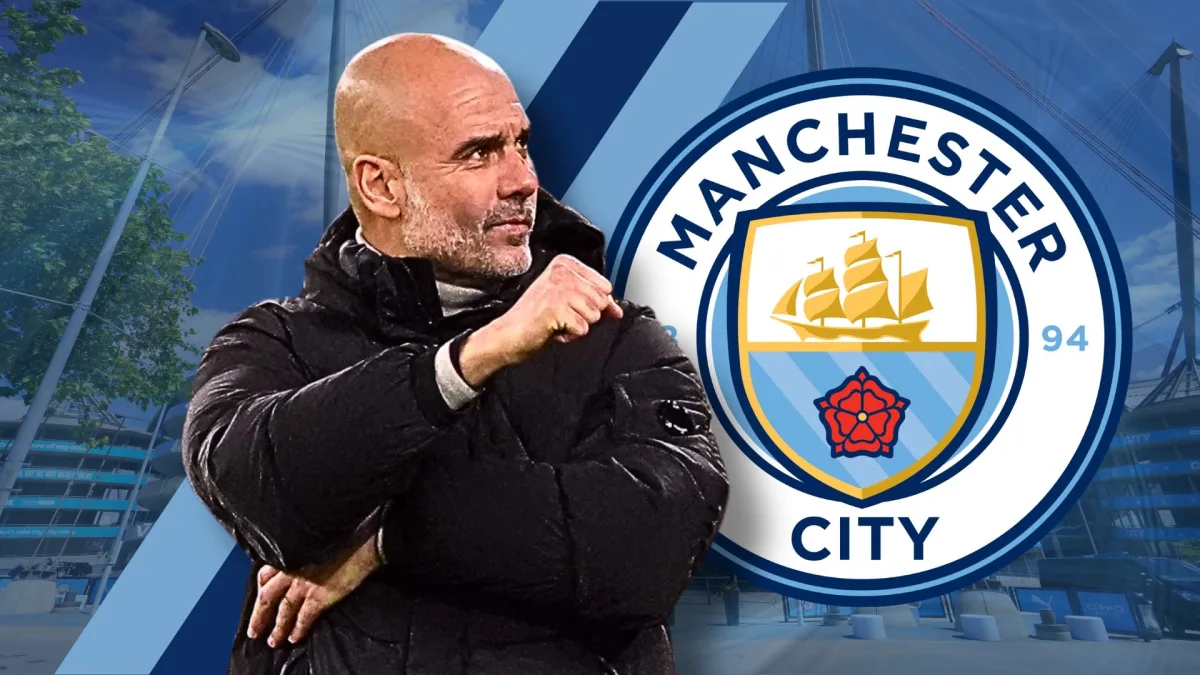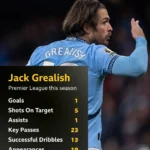Pep Guardiola Confirms Jack Grealish Departure: The End of Manchester City’s €117.5M Experiment

Manchester City manager Pep Guardiola has officially confirmed what many in football circles had been speculating for months: Jack Grealish will be leaving the Etihad Stadium this summer. The England international’s departure marks the end of what can only be described as one of the most scrutinized and ultimately disappointing big-money transfers in recent Premier League history.
The 29-year-old winger, who arrived at Manchester City in 2021 for a British record fee of €117.5 million from Aston Villa, has struggled to justify his hefty price tag throughout his three-year tenure at the club. Guardiola’s confirmation comes as City prepare for the FIFA Club World Cup, with Grealish notably absent from the squad – a decision that effectively sealed his fate at the Premier League champions.
The Transfer That Promised So Much
When Manchester City activated Jack Grealish’s release clause at Aston Villa in August 2021, it sent shockwaves through the football world. The fee not only made him the most expensive British player in history but also demonstrated City’s continued commitment to acquiring the Premier League’s most coveted talents. Grealish was coming off the back of an exceptional season with Villa, where he had established himself as one of the league’s most creative and dynamic players.
The Birmingham-born midfielder had been the heartbeat of Aston Villa’s resurgence under Dean Smith, consistently delivering match-winning performances and becoming a fan favorite at Villa Park. His ability to carry the ball, draw fouls, and create chances from seemingly impossible positions made him one of the most watchable players in English football. The prospect of Grealish combining with Kevin De Bruyne, Bernardo Silva, and other City stars promised to elevate both his game and the team’s attacking potential to new heights.
Manchester City’s pursuit of Grealish was also seen as a statement of intent in their rivalry with other Premier League giants. The signing demonstrated their financial muscle and ambition to continue dominating English football while building a squad capable of conquering Europe. For Grealish, the move represented the pinnacle of his career aspirations – joining a club that had become synonymous with success under Guardiola’s guidance.
The Reality: Struggles to Adapt to Guardiola’s System
However, the reality of Grealish’s time at City proved far more challenging than anyone anticipated. From the outset, it became clear that adapting to Guardiola’s intricate tactical system would require significant adjustments to his natural playing style. The Catalan manager is renowned for his meticulous approach to positional play, demanding precise movement, quick decision-making, and tactical discipline from all his players.
Grealish’s free-flowing, individualistic style – which had made him so effective at Villa – often clashed with City’s systematic approach. Where he had previously been given license to roam, drift wide, and create chances through individual brilliance, Guardiola’s system required him to maintain specific positions and contribute to the team’s collective pressing and passing patterns. This fundamental shift in role and responsibility proved to be a significant hurdle for the England international.
The statistics tell a sobering story of Grealish’s time at City. In his debut season (2021-22), while he managed to contribute 6 goals and 4 assists in 39 appearances across all competitions, his impact was far less pronounced than during his Villa days. The following seasons showed similar patterns – flashes of brilliance overshadowed by periods of inconsistency and tactical uncertainty.
Guardiola’s Frank Assessment
Speaking ahead of City’s FIFA Club World Cup opener against Wydad Casablanca, Guardiola was characteristically honest about the situation. “He had a conversation with the club and we decided what was for the best,” the Spanish manager explained. “Jack is an exceptional player. The only reason why he didn’t play last season is of course my decision. We decide that he has to play. The club was honest, he was honest. Incredible love and respect.”
These comments reveal the mutual respect between player and manager despite the disappointing outcome. Guardiola’s acknowledgment that the lack of playing time was his decision rather than any failing on Grealish’s part demonstrates the professional manner in which both parties have handled what must have been a frustrating situation for all involved.
The manager’s use of phrases like “incredible love and respect” suggests that there are no hard feelings between the parties. This professional approach is typical of how Guardiola has handled similar situations throughout his career, always maintaining dignity and respect even when difficult decisions need to be made for the betterment of the team.
The Club World Cup Omission: Writing on the Wall
Grealish’s exclusion from Manchester City’s FIFA Club World Cup squad served as the clearest indication yet that his time at the Etihad was coming to an end. The tournament, while not the most prestigious competition City will participate in this season, still represents an opportunity for squad players to gain valuable minutes and demonstrate their worth to the manager.
By leaving Grealish out of the traveling party, Guardiola sent an unmistakable message about the player’s future at the club. The decision was particularly significant given that City had recently invested heavily in new signings, including Tijjani Reijnders, Rayan Ait-Nouri, and Rayan Cherki, spending over €130 million in the summer transfer window.
Guardiola’s explanation that staying behind was “the best” for Grealish further reinforced the notion that both club and player had accepted that a parting of ways was inevitable. This pragmatic approach reflects the modern reality of elite football, where even players of Grealish’s caliber can find themselves surplus to requirements if they don’t fit the manager’s tactical vision.
Financial Implications: A Significant Loss
From a financial perspective, Grealish’s departure represents a substantial loss for Manchester City. His current Estimated Transfer Value (ETV) stands at just €43.7 million, having peaked at nearly €90 million shortly after his arrival at the club. This dramatic depreciation in value – from €117.5 million to €43.7 million – illustrates the financial reality of transfers that don’t work out as planned.
The potential loss of over €70 million on the transfer highlights the risks inherent in big-money signings. Even for a club of Manchester City’s financial resources, such losses can impact future transfer strategies and budget allocations. However, City’s strong financial position, bolstered by commercial success and consistent Champions League participation, means they can absorb such losses more easily than most clubs.
The situation also raises questions about transfer valuation and the factors that contribute to a player’s market worth. Grealish’s value at Villa was inflated by several factors: his status as a homegrown English talent, his long-term contract, Villa’s reluctance to sell, and the competitive market for creative players. His struggles at City have demonstrated that transferring value from one club to another is far from guaranteed, regardless of the fee paid.
City’s Summer Transfer Activity: Building for the Future
Manchester City’s summer transfer business has been extensive, with the club investing over €130 million in new talent. The acquisitions of Tijjani Reijnders from AC Milan, Rayan Ait-Nouri from Wolverhampton Wanderers, and Rayan Cherki from Lyon represent a clear strategy to refresh the squad with younger, hungry players who can adapt to Guardiola’s system.
Reijnders, in particular, represents an interesting signing. The Dutch midfielder has shown excellent technical ability and tactical awareness during his time in Serie A, qualities that should translate well to Guardiola’s possession-based system. His signing suggests that City are looking to add depth and competition in midfield areas where Grealish had been expected to contribute.
Ait-Nouri’s addition provides pace and attacking threat from the left flank, an area where Grealish had occasionally featured. The Moroccan international’s direct running style and defensive work rate make him a more natural fit for City’s high-intensity pressing game. Meanwhile, Cherki’s creativity and technical skills offer different options in the final third.
These signings indicate that City are not simply replacing Grealish like-for-like but are instead looking to add players whose profiles better match Guardiola’s tactical requirements. This strategic approach suggests lessons have been learned from the Grealish experience about the importance of tactical fit over pure talent when making high-value acquisitions.
Potential Destinations: Where Next for Grealish?
Several clubs have been linked with moves for Grealish, with Aston Villa and Tottenham Hotspur emerging as the most credible destinations. A return to Villa Park would represent a homecoming for the Birmingham-born player, offering him the chance to rebuild his career at a club where he knows he can thrive.
Aston Villa’s interest makes perfect sense from multiple perspectives. They know exactly what they’re getting with Grealish, having seen him at his peak during his previous stint at the club. Under Unai Emery’s management, Villa have continued to evolve tactically while maintaining the attacking philosophy that originally suited Grealish’s style. The emotional pull of returning home, combined with the promise of regular first-team football, could make Villa an attractive proposition.
Tottenham’s interest is equally intriguing, particularly given their need for creative spark and their ability to offer European football. Ange Postecoglou’s attacking philosophy and high-tempo style could provide the perfect platform for Grealish to rediscover his best form. Spurs’ willingness to give players freedom within their system might suit Grealish better than City’s more rigid tactical structure.
Other potential suitors may emerge as the transfer window progresses. Newcastle United, with their newfound financial backing, could see Grealish as a statement signing who would add quality and experience to their squad. Similarly, West Ham United might view him as the type of creative player who could help them push for European qualification consistently.
The Broader Context: England Career Implications
Grealish’s club situation has inevitably impacted his international prospects with England. Having been a regular starter during Euro 2020 and the 2022 World Cup, his reduced playing time at City has seen him fall down the pecking order under Gareth Southgate and now under interim management following Southgate’s departure.
The upcoming European Championships and World Cup cycles make finding regular club football crucial for Grealish’s international ambitions. At 29, he still has several years left at the highest level, but consistent performances at club level will be essential to regaining his place in the England setup.
His situation reflects the broader challenge facing English players at top Premier League clubs, where international competition for places can limit opportunities. Players like Grealish, James Maddison, and others have found that being at prestigious clubs doesn’t guarantee the playing time necessary to maintain international form.
Lessons for Modern Football Transfers
Grealish’s Manchester City experience offers valuable lessons about modern football transfers. The most obvious is that talent alone doesn’t guarantee success if there isn’t tactical compatibility between player and system. City’s scouting and recruitment teams will undoubtedly analyze what went wrong with the Grealish signing to avoid similar mismatches in the future.
The transfer also highlights the importance of adaptation and flexibility in modern football. Players who succeed at the highest level are increasingly those who can modify their natural instincts to fit different tactical systems. Grealish’s struggle to adapt to City’s requirements contrasts with players like Riyad Mahrez or Raheem Sterling, who successfully modified their games under Guardiola.
Financial sustainability has become increasingly important in modern football, with clubs needing to balance ambition with fiscal responsibility. The Grealish situation demonstrates that even clubs with significant resources must be prepared to cut their losses when signings don’t work out as planned.
Manchester City’s Future: Moving Forward
For Manchester City, Grealish’s departure represents both a financial loss and an opportunity to reshape their squad. The funds generated from his sale, combined with the savings on his substantial wages, will provide resources for further investment in areas where the team needs strengthening.
Guardiola’s honest handling of the situation demonstrates the ruthless decision-making that has characterized his successful tenure at City. The manager’s willingness to move on from high-profile signings who don’t fit his vision shows the clarity of purpose that has driven City’s success.
The club’s recent transfer activity suggests they are already planning for life after Grealish. The focus on younger, more adaptable players indicates a shift in recruitment strategy that prioritizes tactical fit and potential for development within Guardiola’s system.
Conclusion: An Expensive Lesson Learned
Jack Grealish’s departure from Manchester City marks the end of one of the most expensive transfer experiments in Premier League history. While the financial cost has been significant, both club and player can take positives from how the situation has been handled professionally and with mutual respect.
For Grealish, the opportunity to restart his career at a club where he can play regularly and enjoy his football again represents a chance to recapture the form that made him one of England’s most exciting talents. For City, the experience provides valuable lessons about the complexities of modern football transfers and the importance of ensuring tactical compatibility when making major investments.
The football world will watch with interest to see where Grealish’s career goes from here. At 29, he still has time to make a significant impact at his next club and potentially force his way back into the England setup. Meanwhile, Manchester City will continue their pursuit of success with a squad that better reflects Guardiola’s tactical vision, having learned an expensive but valuable lesson about the realities of modern football transfers.
The Grealish saga serves as a reminder that in football, as in life, sometimes the most expensive options aren’t necessarily the best fit. Success comes not just from individual talent, but from finding the right combination of ability, attitude, and tactical suitability – a lesson that both clubs and players would do well to remember in future transfer dealings.















